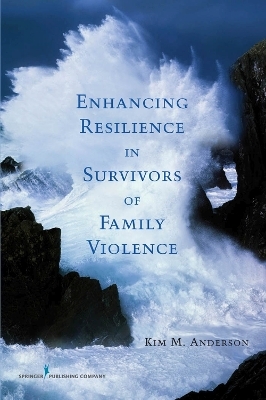
Enhancing Resilience in Survivors of Family Violence
Springer Publishing Co Inc (Verlag)
978-0-8261-1139-5 (ISBN)
According to resiliency theory, resilient persons have 'self-correcting' tendencies that promote their positive adaptation in overcoming trauma. Much of resiliency research focuses on uncovering the attributes (in themselves, their families, or external support systems) that help at-risk individuals withstand stress. ""Victory Over Victimization"" provides new conceptual frameworks and clinical strategies for integrating resilience-oriented and strengths-based treatment with survivors of family violence. The book discusses resilience in survivors of childhood incest, children of battered women, and individuals formerly in violent domestic relationships. These survivors' personal stories of trauma recovery will help practitioners develop a deeper understanding of the many dimensions of healing from family violence.
Kim M. Anderson, PhD, is an associate professor in the School of Social Work at the University of Missouri-Columbia, U.S.A., where she teaches clinical practice and evaluation courses at the graduate level. Dr. Anderson's scholarship bridges gaps between theory and practice by offering conceptual frameworks that captures the interplay of trauma and resilience for survivors of family violence and mental health practitioners Specific populations of women that she studies (although not mutually exclusive) include survivors of childhood incest, adult children of battered women, and individuals formerly in a domestic violence relationship. Her research interests include assessment of risk and resiliency in trauma populations and implementation of strengths-based mental health practice. Throughout the past twenty years, she has embraced the roles of practitioner, researcher, educator, and advocate to help survivors of family violence and the practitioners who serve them.
Chapter 1: Dynamics and Consequences of Oppression and Violence
Chapter 2: The Power of Recovery: Resilience, Posttraumatic Growth and Strengths
Chapter 3: Broadening the Focus of Resilience Research
Chapter 4: Applying a Strengths Perspective to Problem-Based Assessments
Chapter 5: Assessments that Capture Client Strengths, Resilience, and Acts of Resistance
Chapter 6: Creating a Self-Narrative of Strength, Purpose, and Possibility
Chapter 7: Spirituality: Making Meaning of One's Trauma and Purpose in Life
Chapter 8: Recommendations of Survivors of Violence to Other Survivors
Chapter 9: Recommendations of Survivors of Violence to Helping Professionals
Chapter 10: Creating and Maintaining Resilience in the Trauma Clinician and in Organizations
Chapter 11: Where do we go from here?
Appendix A: Solution Focused Question Types
Appendix B: Person Centered Strengths Assessment
Appendix C: Resiliency Assessment of Childhood Protective Factors
Appendix D: Assessment of Resistance Strategies to Childhood Incest
Appendix E: Assessment of Intimate Partner Violence Childhood Survival Strategies
Appendix F: Assessment of Adult Recovery Strategies from Intimate Partner Violence
| Erscheint lt. Verlag | 30.10.2009 |
|---|---|
| Zusatzinfo | Illustrations |
| Verlagsort | New York |
| Sprache | englisch |
| Gewicht | 362 g |
| Themenwelt | Medizin / Pharmazie ► Medizinische Fachgebiete ► Psychiatrie / Psychotherapie |
| Sozialwissenschaften ► Soziologie | |
| ISBN-10 | 0-8261-1139-4 / 0826111394 |
| ISBN-13 | 978-0-8261-1139-5 / 9780826111395 |
| Zustand | Neuware |
| Haben Sie eine Frage zum Produkt? |
aus dem Bereich


